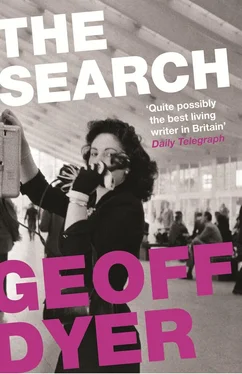Geoff Dyer - The Search
Здесь есть возможность читать онлайн «Geoff Dyer - The Search» весь текст электронной книги совершенно бесплатно (целиком полную версию без сокращений). В некоторых случаях можно слушать аудио, скачать через торрент в формате fb2 и присутствует краткое содержание. Год выпуска: 2013, Издательство: Canongate Books, Жанр: Современная проза, на английском языке. Описание произведения, (предисловие) а так же отзывы посетителей доступны на портале библиотеки ЛибКат.
- Название:The Search
- Автор:
- Издательство:Canongate Books
- Жанр:
- Год:2013
- ISBN:нет данных
- Рейтинг книги:3 / 5. Голосов: 1
-
Избранное:Добавить в избранное
- Отзывы:
-
Ваша оценка:
- 60
- 1
- 2
- 3
- 4
- 5
The Search: краткое содержание, описание и аннотация
Предлагаем к чтению аннотацию, описание, краткое содержание или предисловие (зависит от того, что написал сам автор книги «The Search»). Если вы не нашли необходимую информацию о книге — напишите в комментариях, мы постараемся отыскать её.
The Search — читать онлайн бесплатно полную книгу (весь текст) целиком
Ниже представлен текст книги, разбитый по страницам. Система сохранения места последней прочитанной страницы, позволяет с удобством читать онлайн бесплатно книгу «The Search», без необходимости каждый раз заново искать на чём Вы остановились. Поставьте закладку, и сможете в любой момент перейти на страницу, на которой закончили чтение.
Интервал:
Закладка:
Walker dawdled, when he left the diner, mesmerized by the complexity and abundance of activity suspended, silent as a photograph, around him. There was no narrative here — or there was a new kind of narrative, one that ran across time rather than through it. We seek explanation in terms of causality, in terms of one event succeeding another. Here simultaneity, the way every action and person in the city was linked to every other, was the only explanation. Either there was no such thing as coincidence or — and it amounted to the same thing — there was only coincidence.
Tired suddenly, Walker crossed over to the Metropolitan Hotel. In the silent bustle of the lobby he helped himself to the key to a room on the top floor. The curtains were drawn in his room and he felt relieved by the comforting dimness. He showered and climbed between the white right-angles of sheets.
He felt sure that he was getting nearer to Malory — but it was just as likely that he was further away than ever. He had no way of knowing. There was no longer any correlation between time and distance; each meant nothing in terms of the other. Perhaps Malory was a week ahead, or a day, or perhaps he was months or a year away by now. He could have been a mile away or he could have been a hundred, a thousand miles away. . Maybe the search would never end and he would continue hunting for Malory until he was an old man, until he died. Unable to move, penniless, reduced to scanning the articles in archives. Tolerated and mocked by the library staff, perhaps managing to persuade a young enthusiast of the importance of his work, bequeathing him a deranged mass of notes, leaving future generations to complete the task to which he had dedicated his life.
He thought of people who spent their lives tracking down the Abominable Snowman or the Loch Ness Monster. The whole point of these things was that they existed only in sightings. You could never get scientific proof of their existence. That was their purpose: they were a lure, a metaphor for the Himalayas of the unknown. As soon as the Yeti was sighted it would cease to exist. Yeti was probably Tibetan for a being whose existence is constantly hinted at — footprints, droppings — but cannot be proved. . He was drifting on the edge of sleep, his thoughts becoming flecked with dreams. Time and distance. Footprints in water. Traces of dream. .
CHAPTER FOURTEEN
The clock next to his bed was still showing 4.09 when he woke. Drawing back the curtain he found the city still flooded with afternoon sunshine. Outside his window a bird was frozen in flight, wind ruffling its feathers, wings arched perfectly, eyes full of sky. He looked down into the street, the immobile crowds still there.
He took food from the kitchen and left the hotel. Nothing had changed but his internal rhythm insisted that it was morning: the streets seemed infused with the energetic bustle of people commencing their days. As he moved through the living statues he again became absorbed in the wealth of detail revealed around him. He saw a coke can poised in mid-air between a cyclist’s hand and the waiting bin. Across the way a workman was leaning over a pneumatic drill, another watching him, tilting back his yellow safety helmet.
In a shop window Walker saw his reflection shimmer through racks of camera equipment. He wanted to head out of town, to move on, but it was difficult to know how. There were plenty of cars but with the traffic gridlocked in time it would be impossible to move.
He continued walking until he came across a guy locking his bike to a sign. Walker extricated the bike and cycled through the city, cutting across a park where people were frozen in the act of jogging or chasing after balls, staring up at a blue disc of frisbee. A dog was leaping to catch a ball between its teeth and the trees waited for the wind to pass through their leaves. On the far side of the park there were fewer people and Walker moved more quickly towards the outskirts of the city where old people waited at bus stops and mothers pushed prams. He gave no thought to where he was heading. Motives and purpose had dissolved within him. He cast no shadow.
After cycling for an hour he had still seen no movement — no cars, no people. He crossed a bridge and cycled through a landscape of gentle hills and tree-shaped trees. A sign said CRESCENT CITY 25 MILES. He became aware of a breeze, a few clouds. A flock of birds, drifting smoke. A car came roaring towards him, passed in a swirl of grit and fumes. He saw a dog padding along the roadside, tail wagging. Minutes later he waved at a woman and a child who smiled and waved back. Their gestures — and especially the child’s red bobble hat — were surprisingly familiar and as he cycled towards Crescent City little details of the landscape also touched elusive chords in his memory.
In the city itself he was constantly assailed by a sense of déjà vu . Although he had never been here before every street corner and house was steeped in memories. Entering the bakery, asking for croissants, handing over coins, the way the assistant smiled and said, ‘ Merci, au revoir ’ — each gesture was like an echo of one that had already occurred. When the desk clerk showed him to his room at a boarding house he knew, fractionally before the door was opened, how it would be arranged: the bed tucked into an alcove, a porcelain jug and bowl on a chest of drawers, sunlight pouring into the dim room when the shutters were opened. In the days that followed a single detail often brought back a whole sequence of events: seeing two birds perched on a phone line recalled a previous time when he had walked down exactly this street, at precisely this time of the evening, with the elderly couple limping towards him.
And then there were the wind-chimes which hung from the balconies of houses. All over the city the air was full of the sound of fragile tinkling. It was a beautiful sound and Walker was startled by how deeply these chimes affected him. The breeze connected houses to each other like phone lines, brushing one set of chimes fractionally before another as it made its way through the streets.
More than anything else it was these chimes that filled him with déjà vu . Each chime was less like the actual noise of the metal tubes touching than the memory of that moment, of that sound, endlessly renewed. He made a recording of the chimes but the tape made them sound like wire hangers jangling in a wardrobe, preserving none of their resonance.
The chimes haunted Walker, convincing him that he had been here before, but however hard he tried — in fact the harder he tried the more elusive the sense became — he was unable to fathom the origin of this sensation. He wondered if Malory had experienced the same thing when he had passed through Crescent City. Perhaps it was experienced by everyone who came here and the sensation of déjà vu — there was something familiar even about this sequence of reasoning — was the city’s distinguishing feature, like the canals of Venice, the garbage dumps of Leonia or the spires of Christminster. Walker’s sense of following in his own footsteps grew steadily but no less subtly stronger.
Then, as he walked down Esplanade, each step adding to — without confirming — the feeling that he had done this before, he began to wonder if there were some way in which he could use this to his advantage. Until now he had been dragging memories in his wake; he had to try to allow these hinted memories to lead him onwards, to show him what to do next. Since it became more difficult to pin down the feeling the harder he concentrated, he had to make his mind blank, to cease being an active agent of his own intentions and allow the sensation to ebb and flow as he wandered. The problem was that a sense of déjà vu pervaded the entire city and as time passed the hinted memories he sought to follow became overlaid by the actual memories of the previous days. The strongest, deepest, most allusive sensations were the most elusive and least immediate.
Читать дальшеИнтервал:
Закладка:
Похожие книги на «The Search»
Представляем Вашему вниманию похожие книги на «The Search» списком для выбора. Мы отобрали схожую по названию и смыслу литературу в надежде предоставить читателям больше вариантов отыскать новые, интересные, ещё непрочитанные произведения.
Обсуждение, отзывы о книге «The Search» и просто собственные мнения читателей. Оставьте ваши комментарии, напишите, что Вы думаете о произведении, его смысле или главных героях. Укажите что конкретно понравилось, а что нет, и почему Вы так считаете.












